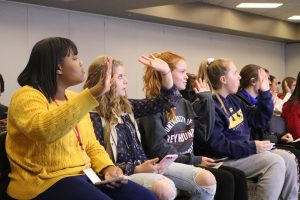LovEd, a workshop that educates students about how to maintain healthy relationships, took place at the University of Indianapolis on Oct. 23. The presentation gave UIndy students the opportunity to not only learn more about love, but learn more about Founder and CEO of LovEd Isabell Springer program and research that she has worked on over the past eight years.
Director of Student Support and Title IX Academic Advisor Anne Moelk said that she invited Springer to come speak after hearing about her research because she thought it would reach a number of students and be beneficial to the UIndy community.
“My work tends to focus on the negatives and I think that maybe if college students knew how to be in relationships, it could decrease the amount of sexual violence and assaults. And this is why I asked Isabell [Springer] to come to UIndy,” Moelk said.
After going through a divorce 14 years ago, Springer said she was left wanting to find the answer as to why relationships do not always work, which drove her to go to school to become a psychotherapist. After about five years of research on relationships, Springer started presenting her results and founded LovEd.
“In order to make smart choices in love, we need to know what love is not.”
According to Springer, there are three parts of the LovEd program: Clarity, confidence and communication. In her presentation at UIndy, she discussed the clarity stage. Springer said that the biggest mistake individuals make in relationships is communication and, in today’s culture, few people properly communicate with their partner. This creates a separation between the two people in the relationship.
“Communication is not a big deal,” Springer said, “but it is a deal breaker.”
According to Springer, growing up most people are taught to read or write, but no one is taught how to love or be in a relationship effectively and base their love lives off of trial and error. LovEd gives people the opportunity to learn that information.
“In order to make smart choices in love,” Springer said, “we need to know what love is not.”
During the presentation, Springer asked the audience if they ever felt unimportant, undervalued or not good enough and 91 percent of the room responded yes in an anonymous poll. When asked if they had ever felt persuaded to look, act, or be a certain way to fit in or be liked, 88 percent of the room said yes. According to Springer, these feelings in relationships can cause issues and sometimes turn abusive. She said that if an individual is involved in an abusive relationship, whether it pertains to sexual, verbal or emotional abuse, they can end it.
One point that Springer said she likes to speak about in her presentation, is that sex is an activity and it means something different to every person. A relationship does not automatically skip a stage just because of sex or saying ‘I love you.’ Communication is needed to determine what sex or I love you means to each half of a relationship.
“Sex is an activity like eating candy, it doesn’t have any meaning except for the meaning you give it,” Springer said.

According to Springer, good, effective relationships have both romantic attraction and emotional maturity. There are six levels of attraction, the first three being no attraction at all. Level four is the “just friends” level, where a connection is made with another individual enough to have a relationship as friends. Level five is where both parties are attracted and level six is the highest level of attraction.
According to Springer, the main reason people get divorced or have an affair is because they are in a relationship with somebody who is under a level five and they think that it could turn into something more. The first 6 to 12 months of a relationship are in what is called the infatuation stage. During this stage, couples are still getting to know each other and have the initial excitement of something new, according to Springer.
Freshman nursing major Leetta Rainwater said that she was shocked that the infatuation period is 6 to 12 months and said that she learned everybody is at a different level of maturity at different times. Rainwater said she has been in a relationship for the past three years and thinks that these tips were helpful in applying to her own relationship.
“I believe this would be helpful to my relationship because my boyfriend is in the military and communication is crucial to our relationship,” Rainwater said.
Springer studied and researched in order to determine why so many people struggled with relationships and why some relationships work and others do not. She said she started LovEd to help those who do not have it figured out, but want to.







